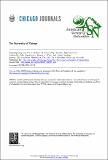Haplodiploidy and the evolution of eusociality : worker reproduction
Date
10/2013Metadata
Show full item recordAbstract
Hamilton’s haplodiploidy hypothesis suggests that the relatively higher relatedness of full sisters in haplodiploid populations promotes altruistic sib rearing and, consequently, the evolution of eusociality. This haplodiploidy effect works when some broods have a relatively female-biased sex ratio and other broods have a relatively male-biased sex ratio, termed split sex ratios. There is empirical evidence for two scenarios having potentially led to split sex ratios en route to eusociality: unmated queens and queen replacement. A recent analysis of these two scenarios has suggested that haplodiploidy can either promote or inhibit the evolution of eusociality and that the effect is usually small. However, this work made the simplifying assumptions that there is only negligible reproduction by workers and that their offspring have the same sex ratio as those produced by the queen. Here, we relax these assumptions and find that worker reproduction has a negative influence on the evolution of helping, either reducing the extent to which it is promoted or leading to it being inhibited. This is particularly so when workers are unmated and hence constrained to produce only sons, by arrhenotoky. Overall, when parameterized with empirical data, our results suggest that split sex ratios in haplodiploid species have not played an important role in facilitating the evolution of eusociality.
Citation
Alpedrinha , J , West , S & Gardner , A 2013 , ' Haplodiploidy and the evolution of eusociality : worker reproduction ' , American Naturalist , vol. 182 , no. 4 , pp. 421-438 . https://doi.org/10.1086/671994
Publication
American Naturalist
Status
Peer reviewed
ISSN
0003-0147Type
Journal article
Description
The authors acknowledge the European Research Council, the Royal Society, and Balliol College for funding.Collections
Items in the St Andrews Research Repository are protected by copyright, with all rights reserved, unless otherwise indicated.

